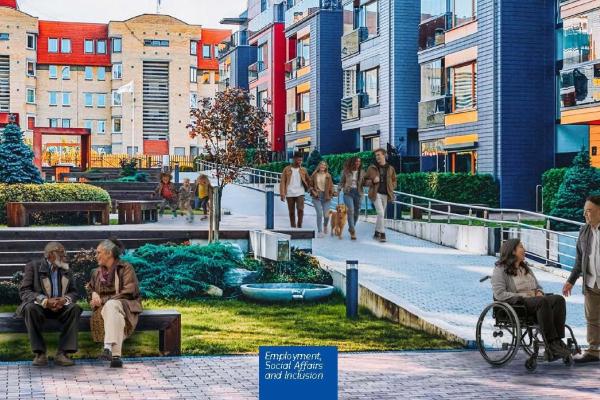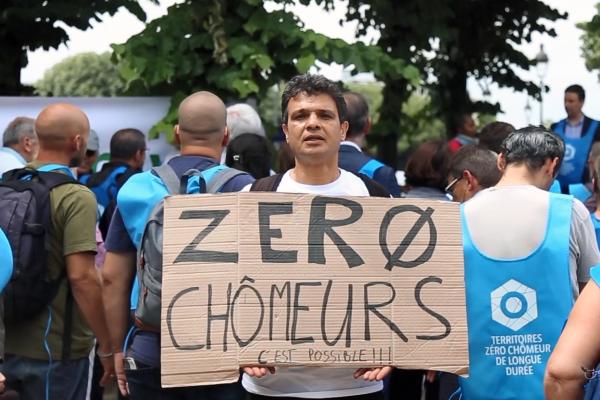Stark divisions in our societies caused by social inequalities and cuts to services have been exacerbated in 2020 with the COVID-19 outbreak. The health crisis and its economic and social consequences will have a stronger impact on the most vulnerable – including individuals with poor health, without a home, migrants, low-income earners, and single-parent families.
Through the ESF Transnational Cooperation Platform and its Community of Practice on Social Inclusion, managing authorities and stakeholders can exchange good practices in tackling inequalities and social exclusion. This community of practice addresses three sub-themes: child poverty, deinstitutionalisation, and homelessness.
Child poverty
This sub-theme focuses on using the ESF+ to provide equal opportunities by promoting access to – and completion of - quality, inclusive education starting from early childhood, including disadvantaged groups. The sub-theme looks at mapping good practices focussing on creating supportive environments, including for early childhood education and early support services.
Sub-theme publications:
- Mini-toolkit: Use of the European Social Fund for actions to combat poverty and social exclusion of children (2021)
- Mapping of good practices on creating supportive environments (upcoming)
Deinstitutionalisation
This sub-theme looks at supporting independent living of the most socially excluded and vulnerable. It reviews housing solutions that meet the needs of people who are severely excluded, highly isolated, and may encounter serious mental health problems.
Sub-theme publications:
- Recommendation paper on integrated support solutions including supported housing (Upcoming. 2022)
- Mini-toolkit on the training of personnel in relation to the use of the ESF to support independent living (Upcoming, 2022)
Homelessness
This sub-theme focuses on people experiencing or at risk of - homelessness and housing exclusion. This includes people in inadequate and insecure housing, people with mental health problems at risk of becoming homeless, young people in precarious accommodation, migrants and marginalised ethnic minority experiencing housing exclusion. The sub-theme focuses on housing-led approaches and Housing First strategies, the latter being policies prioritising the provision of affordable and permanent housing to people experiencing homelessness, enabling them to live in their own home as part of a community, with a high degree of choice and control.
Sub-theme publications:
- Checklist: How to target and support people experiencing homelessness with the ESF+ (2021)
- Recommendation paper on how to sustain Deinstitutionalisation efforts, upcoming (Upcoming. 2022)
Activities
Find out what activities have taken place as part of this community of practice. Use the menu below to see each activity.
Please note: Activities are being updated on an ongoing basis.
The kick-off meeting jump-started the work of the community of practice in the framework of the ESF Transnational Cooperation Platform until June 2022. The aim of the kick-off meeting was to present and discuss the objectives of the Community of Practice, the sub-themes and the work programme, allowing members to express interest in hosting or participating in mutual learning events, and to introduce communication mechanisms and ways of co-working.
- Agenda: ESF TCP Kick-off meeting of the Community of Practice Social Inclusion (2020) - English (95.7 KB - PDF)
- Summary report: ESF TCP Kick-off meeting of the Community of Practice Social Inclusion (2020) - English (126 KB - PDF)
This training allowed 20 members of the Community of Practice on Social Inclusion to reflect on their future plans on how to programme actions to address child poverty in the context of the ESF+. Participants presented lessons learnt from programming actions addressing child poverty with funding by the ESF.
Highlighted lessons learned included taking approaches that draw attention to the needs of the whole family, targeted at both adults and directly at children in an integrated and person-centred approach. Early intervention is a key to successful strategies and actions should be designed to ensure the sustainability and continuity of positive outcomes.
Members of the Community of Practice on Social Inclusion reviewed how to programme housing-led projects, in particular projects based on the Housing First approach, in the future ESF+. Participants presented lessons learnt from programming Housing First with funding by the ESF and discussed how to develop comprehensive Housing First strategies.
In a peer consultation process, participants exchanged on the planned priorities and implementation of Housing First with funding from the ESF+.
- Agenda: ESF TCP Peer-to-peer training on programming Housing First approaches in the ESF+ (2021) - English (109 KB - PDF)
- Summary report: ESF TCP Peer-to-peer training on programming Housing First approaches in the ESF+ (2021) - English (156 KB - PDF)
This online seminar focused on building links between national and international commitments to address child poverty made by governments. Presentations highlighted experiences of the use of the ESF for concrete actions relating to implementing these commitments. The ‘National Strategy against Poverty and Social Exclusion’ and the future ‘National Action Plan for the Implementation of the Child Guarantee’ in Spain and the ‘National Inclusion Strategy’ and the ‘Sure Start Children’s Houses and Early Years Programmes’ in Hungary were presented, followed by a discussion around national strategies and funding to address child poverty.
This peer review supported members of the Community of Practice on Social Inclusion to focus on approaches funded by the ESF, in combination with other budgets, that move from large scale institutional approaches to community-based care. The Peer Review looked at how to design and implement structural reforms working with service providers, stakeholders, beneficiaries or their families, to shift from institutional to community-based care.
This plenary meeting discussed lessons learnt and gave an outlook on upcoming activities. In general, knowledge exchange, networking opportunities, as well as the information provided by stakeholders on the concrete implementation of practices was valued by community of practice members. Priorities for future activities will -focus on integrated multi-funding approaches and the involvement of key stakeholders in ESF+ programming.
- Agenda: ESF TCP First Plenary Meeting of the Community of Practice on Social Inclusion (2021) - English (104 KB - PDF)
- Summary report: ESF TCP First Plenary Meeting of the Community of Practice on Social Inclusion (2021) - English (111 KB - PDF)
This study visit presented practices of scaling-up Housing First in the Netherlands by the Platform ‘Housing First Nederland’ and by HVO-Querido, an expert support service for people who are rehoused through Housing First. Participants had the chance to exchange on different aspects of scaling up with the experts from the Netherlands, including the challenges to upscale housing first, the main actors to involve and the main elements to keep in mind when using the ESF for Housing First. Other lessons learnt were presented from Finland, Belgium and Czechia. During the discussion, participants agreed on the need to provide high-quality and diverse support services to accompany people who experienced homelessness, back into housing.
- Agenda: ESF TCP Study visit on scaling up Housing First under the ESF (2021) - English (112 KB - PDF)
- Summary report: ESF TCP Study visit on scaling up Housing First under the ESF (2021) - English (185 KB - PDF)
In light of the European Child Guarantee, this peer review focused on the use of the ESF+ to ensure integrated working (i.e. a holistic approach to address child poverty, with a child-centred and multidisciplinary model) to prevent child poverty and exclusion. Examples of integrated practices and multi-sectoral cooperation in Ireland, Greece and Italy were presented. Participants agreed on the importance of initiating integrated working at the national level, to break down silos and to support integrated working models between different ministries, as well as including civil society organisations that are active on the ground and have a deep knowledge of the local needs.
This peer review looked at the cooperation between relevant stakeholders (i.e. managing authorities, implementing organisations, local authorities and NGOs planning and running Housing First programmes), to gain buy-in at political level and improve capacity to access European funding. The main lessons learnt from the event:
- Local/regional authorities, organisations working with people affected by homelessness and public bodies in charge of housing are key stakeholders who need to be involved continuously in the development and implementation of a Housing First strategy.
- Formal and informal collaboration between managing authorities, policy representatives and project implementers helps to design sustainable Housing First projects under the ESF, and to build capacity to access European funding.
Local cooperation is important, for instance, social services and health services contribute experiences from their work towards the development of strategies.
- Agenda: Peer review onimproving the cooperation among stakeholders to start Housing First programmes under the ESF+ (2021) - English (141 KB - PDF)
- Summary report: Peer review onimproving the cooperation among stakeholders to start Housing First programmes under the ESF+ (2021) - English (172 KB - PDF)
This study visit showcased an example of integrated support solutions including supported housing to meet the needs of people with mental health issues or who find themselves severely excluded or isolated.
- Agenda: Study visit on integrated support solutions (including supported housing) (2021) - English (105 KB - PDF)
- Summary report: Study visit on integrated support solutions (including supported housing) (2021) - English (144 KB - PDF)
This study visit focused on early support to tackle child poverty, exploring the role of professionals working in a multi-disciplinary way and ‘experts by experience’. The event looked at early support services offered in disadvantaged areas and/or to children and families with a disadvantaged background (lone parents, new communities, Roma population etc.) in view of ensuring links to mainstream services and involve the people from the communities concerned in the design, implementation and evaluation of the services provided.
- Agenda: Study visit on early support and ‘experts by experience’ (2022) – English (124 KB – PDF)
This webinar presented practices that aim to prevent homelessness and further marginalisation, with a particular focus on ex-offenders. The webinar further discussed how the European Social Fund Plus (ESF+) can fund community-based care and related housing policies to support people leaving institutions to avoid falling into homelessness or further marginalisation.
The peer-to-peer training presented practices aiming at training people to take up roles needed to support independent living, including personal assistants and other staff engaged in delivering community-based services. During the training, participants also discussed how to develop the skills needed for supporting independent living, staff recruitment and retention, how to encourage the shift of mindset towards independent living, as well as the role of ESF+.



